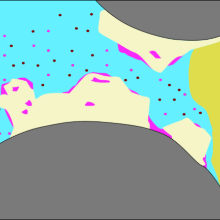Description
Carbon Capture and Storage (CCS) will be utilized in the near future to mitigate the global climate change by reducing the emissions of CO2, which is injected in the subsurface. But also for an optimal use of renewable energies, gas will need to be stored underground to buffer the fluctuating supply and demand. Such gases may be either natural gas or synthetic methane (CH4) or hydrogen (H2) or simply compressed air. Optimal reservoirs for gas storage are located in variable depths, depending on geological conditions and the gas which is to be stored. They are separated from overlying aquifers by an impermeable cap rock. For a successfully operating storage, it is a necessity to avoid any leakage of stored gases.
Thus, further research to improve sealing technologies used to mitigate potential leakage, like the injection of cement or biomineralization is necessary, which requires understanding of both the (bio-) and geochemical reactions and the transport of the different components in both gas and water phase. Microbially induced calcium carbonate precipitation (MICP) is currently becoming an established method of biomineralization and in previous projects, a numerical model was developed for this biomineralization method (e.g.: Numerical investigations on coupled flow and bio-geochemical processes during and after storage of CO2 in the subsurface). However, precipitation may also be induced by injection of extracted or plant-based sources of urease or at elevated temperatures. Experimental investigations of our collaborators at Montana State University (MSU) in Bozeman, USA focus on ureolysis-based methods involving enzyme (EICP) or elevated temperatures (TICP) instead of microbes to incude calcium carbonate precipitation. The applicability of a certain method is largely determined by the depth below ground surface and the local geothermal gradient. MICP relies on the activity of living bacterial cells, which only thrive within a limited temperature range (<45°C). This temperature range may include the shallow subsurface, where CH4 or natural gas may be stored, but is lower than the temperatures commonly present at depths suitable for CO2 storage. As a consequence, other technologies such as EICP or TICP have to be developed and demonstrated in the field. The first main goal of this project is to develop a generalized biomineralization model concept for induced calcium carbonate precipitation (ICP) which can account for all three processes, MICP, EICP, and TICP.
A second objective of this project is to include the effects of ICP on the two-phase flow behavior as, with regard to using ICP to mitigate gas leakage from subsurface reservoirs, sufficient sealing might not necessarily depend on reducing the intrinsic permeability, but rather rely on increasing the entry pressure of the cap rock to values higher than the reservoir pressure. To be able to include such effects into the model, first, experimental investigations on the influence of ICP on two-phase flow parameters are conducted at the University of Stuttgart.
Project leader
Dr.-Ing. Hommel, Johannes
Researcher
Dr.-Ing. Hommel, Johannes
Partner
Prof. Gerlach, Robin
Department
Duration
01/2017 - 03/2021
Cooperation partners
Montana State University (MSU) in Bozeman, USA
Contact

Johannes Hommel
Dr.-Ing.Academic Staff



